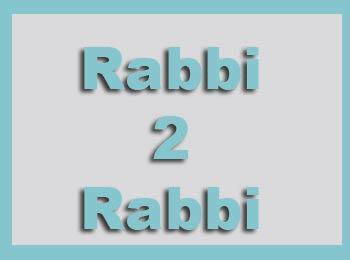As representatives of their faith, it’s a chillul HaShem when bad behaviour makes them sound like hypocrites for preaching to others about being good Jews
Rabbi N. Daniel Korobkin
Beth Avraham Yoseph Congregation, Toronto
Rabbi Lisa Grushcow
Temple Emanu-El-Beth Sholom, Montreal
Rabbi Korobkin: Rabbinic scandals seem to be the news du jour. It’s hard to pick up a Jewish periodical without reading of some rabbi who has betrayed a confidence or behaved scandalously.
Of course, these stories are sensational, because they play to our greatest fears: the very clergy we hold in such high regard, who are supposed to be our paragons of virtue, have behaved in ways that we wouldn’t expect even of lowly people. Surely this phenomenon isn’t new, but we seem to have been barraged lately by a spate of new cases.
How should we react to our congregants? Have rabbis lost their congregants’ confidence? If so, how do we regain it?
Rabbi Grushcow: These kinds of betrayals of trust indeed are our greatest fears. But what I also find disturbing is how much disbelief there is, as if someone who is a gifted spiritual leader and teacher could not have any deep flaws or make any serious mistakes.
I think we too often ignore how clergy are prized for their charisma, and charisma can sometimes have its dark side. It’s precisely because people don’t want to think badly of their clergy that some of our colleagues feel they have license to violate boundaries or believe they won’t face any consequences. Often, the offenders even believe their own hype enough to convince themselves they have not done anything wrong.
It is precisely at those moments that community leaders, rabbinic associations and others should be able to provide guidance and correction, allow for the possibility of tshuvah, and, above all, remove offenders from positions where they can cause harm.
For me, the mystery is not why clergy violate boundaries – we are human, after all, and we sometimes make terrible mistakes. The question is why these behaviours are tolerated, and even covered up. Precisely because of this, I think we have a responsibility to speak from the pulpit about these issues, however uncomfortable it may be – not to be judge and jury, but to make clear that we will not be silent.
Rabbi Korobkin: Rabbis are human, yes. But I think in the eyes of many of our congregants, we represent Judaism, the Torah and even, to a certain extent, God. How, they ask, can a man or woman of God behave this way? Is this what Judaism espouses? And if their behaviour isn’t in line with Judaism, doesn’t that make them hypocrites when they preach about being a good Jew?
This is the chillul HaShem within every rabbinic scandal large or small, for which all of us must mourn and try our best to take corrective measures.
I’ve said the following publicly on a number of occasions when introducing something “preachy” from the pulpit: “What I’m about to say, I say first and foremost to myself, since my own failings require me to hear the message most.”
At least this way, my congregants can realize that if they do see me fail on occasion, it’s because their rabbi is imperfect, reaching and trying to grow just like the rest of us.
Rabbi Grushcow: I think you say this beautifully. It’s true that it can be very hard to say “preachy” things in a non-preachy way.
It’s one thing for you and I, and the vast majority of our colleagues, to constantly work on self-improvement, growth, and increased sensitivity and understanding. We know that for us, as for every human being, having a good name is of the utmost importance. The recent scandals have reminded me, for instance, to have a door with a window installed in my study, not because I’m worried I will do something wrong, but because it helps to remove any possible concerns about wrongdoing.
At the same time, there are colleagues who clearly are crossing lines and causing harm. For them, it is not about an occasional failing or imperfection. It is a fundamental betrayal of trust. In those cases, we as a rabbinic community – and as a Jewish community – bear the responsibility of action. If we don’t, we, too, are guilty of chillul HaShem.
The Torah tells us not to stand idly by the blood of our neighbours. We need to take boundary violations as seriously as the physical shedding of blood.
